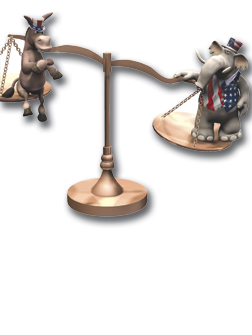 Wisconsin
Lawyer
Wisconsin
Lawyer
Vol. 81, No. 12, December
2008
Politics in Civil Jury Selection
A recent analysis of mock trial data
determined that in assessing damages, factors other than political
leaning are more useful in predicting if a juror will award large or
small damage amounts. Read what social-political attitudes are more
predictive of juror behavior than is party affiliation.
 by Alan M.
Tuerkheimer
by Alan M.
Tuerkheimer
 hen lawyers undertake the
civil-jury selection process, they often look for clues that, they hope,
will provide insight into a potential juror’s political outlook.
To many lawyers, a juror’s political perspective
is so
important that litigation teams nationwide spend time and resources
determining whether a prospective juror has donated to or is affiliated
with a political party. If such an inquiry is fruitless, even more time
may be spent trying to deduce party identification. Does a certain juror
have on his car an Obama sticker, a McCain sticker, or any sticker
indicating candidate preference? When summoned on the first day of
trial, is a particular juror reading about the virtues of Reaganomics or
is she more interested in learning about how left-leaning approaches to
economic stewardship are a recipe for financial success? Does a juror
appear to be pro-choice, pro-death penalty, anti-tax, anti-government,
or pro-environment? These inquiries assume that when a person’s
political compass is revealed, a host of other litigation-related
attitudes, beliefs, and opinions become evident and will reveal how a
juror will render a verdict. Especially for attorneys who are involved
in politics, the most imperative task for providing insight into how
jurors will assess damages is to determine jurors’ political
points of view.
hen lawyers undertake the
civil-jury selection process, they often look for clues that, they hope,
will provide insight into a potential juror’s political outlook.
To many lawyers, a juror’s political perspective
is so
important that litigation teams nationwide spend time and resources
determining whether a prospective juror has donated to or is affiliated
with a political party. If such an inquiry is fruitless, even more time
may be spent trying to deduce party identification. Does a certain juror
have on his car an Obama sticker, a McCain sticker, or any sticker
indicating candidate preference? When summoned on the first day of
trial, is a particular juror reading about the virtues of Reaganomics or
is she more interested in learning about how left-leaning approaches to
economic stewardship are a recipe for financial success? Does a juror
appear to be pro-choice, pro-death penalty, anti-tax, anti-government,
or pro-environment? These inquiries assume that when a person’s
political compass is revealed, a host of other litigation-related
attitudes, beliefs, and opinions become evident and will reveal how a
juror will render a verdict. Especially for attorneys who are involved
in politics, the most imperative task for providing insight into how
jurors will assess damages is to determine jurors’ political
points of view.
Specifically, the thinking goes, the more left-leaning or liberal
someone is, the more likely it is that the person will be receptive to
rendering large damage amounts and assigning punitive damages and the
less likely that he or she will place limits on the amount of money
juries can award. Conversely, many attorneys believe that if someone
tilts right, or is more conservative, the person is less likely to award
money and to support punitive damages and is more interested in
“tort reform.” During voir dire, and through written
questionnaires, many attorneys go to great lengths to discern where
potential jurors fall on the political spectrum so the attorneys can use
that information to make inferences about how each juror will determine
appropriate damage awards.
Mock Trial Data
Given the recent elections and the nation’s attention on the
political process, Zagnoli McEvoy Foley (Zagnoli), a litigation
consulting firm in Chicago that conducts mock trials throughout the
country, analyzed recent mock trial data in an attempt to determine if
political leaning and damage assessments are intertwined. A total of 476
mock jurors who identified themselves as either Democrats or Republicans
were studied. These jurors were participants in mock trials for cases
involving a personal injury, product liability, or medical malpractice
claim. Cases in which a corporation sued another corporation were not
used as part of this analysis. Jurors of all ages, ethnicities, and
educational backgrounds and from throughout the United States
participated. Every one of these mock trials involved the prospect of
rendering damages; jurors would deliberate and subsequently have a
chance to award money.
The purpose of a mock trial is to discover jurors’
reactions to key facts, strategies, themes, arguments, and damages. Mock
trials are not designed to accurately predict what the actual verdict
will be but instead to provide insights, in a simulated, condensed
setting, that help attorneys prepare for trial. However, with a large
enough number of participants in a variety of venues, generalizations
about damage assessments can be made with a high degree of confidence.
When mock jurors show up for a focus group, before hearing any
case-specific information, they fill out a lengthy questionnaire that
asks basic demographic and opinion questions, simulating what would be
asked of them during voir dire. One area probed deals with attitudes
toward lawsuits and jury awards in general. These questions measure how
jurors feel about awarding damages, including punitive damages, and
whether they are interested in restricting the amount of money juries
can award.
Jurors also are asked about a range of socio-political attitudes.
These attitudes range from the obvious (for example, do they identify
themselves as liberal, moderate, or conservative) to the more direct
(how they planned to vote in the November election) to the more subtle
(do they feel the government should provide free health care for all
citizens). All of these variables are looked at in conjunction with
attitudinal variables on damages, and the actual rendering of damage
awards, to learn more about the interplay between political attitudes
and a propensity to award money. The Zagnoli study found that while
political leaning tends to correlate with what jurors say about
damages in civil cases, it does not predict whether or how much they
actually award. In other words, political leaning is related to what a
juror says but not necessarily to what a juror does; thus, political
party allegiance should not be too heavily relied on during jury
selection. The key lesson learned is that other factors prove more
useful in predicting whether a juror will award large or small damage
amounts.
Juror Attitudes about Damages
For purposes of this analysis, jurors were divided according to four
basic categories of damages, which were determined based on how much
they actually awarded during a mock trial: no damages, low damages,
medium damages, and high damages. The first test compared the number of
Republicans and Democrats in each category, and the results showed no
significant differences regarding damage awards. In other words, being a
Republican or being a Democrat did not predict how much was awarded for
damages. In fact, 22.3 percent of self-described Democrats awarded no
money damages, while 20.8 percent of self-described Republicans awarded
no money. This small difference of 1.5 percent is insignificant both in
the formal statistical sense and from a loosely subjective
interpretation of the data. Also, 53.2 percent of Democrats were in the
medium and high categories of damage assessments, while 50.4 percent of
Republicans were medium- and high-damages jurors – this also was
not significant. A lawyer using political outlook as a central guide in
jury selection is leaving more up to chance than she would hope.

Alan M. Tuerkheimer, U.W. 2000, is a trial
consultant with Zagnoli McEvoy Foley LLC, Chicago, and is licensed to
practice law in Wisconsin. He can be reached at atuerkheimer@zmf.com.
Even though there were no differences in the sums Republicans and
Democrats actually awarded mock plaintiffs, jurors’ responses to
certain questionnaire items were more revealing. In other words, there
is something significant about what jurors have to say about awarding
damages even if there is nothing significant about what they do. Jurors
were asked whether they agree or disagree with the idea of placing
limits on the amount of money juries can award. As might be expected,
nearly three-quarters (74 percent) of Republicans agreed with that
statement. A significantly smaller percentage of Democrats, 54 percent,
agreed with that statement. For a plaintiff’s attorney thinking he
wants as many Democrats on the panel as possible, the results show
roughly 6 in 12 Democrats agree with damage caps (although that is lower
than the percentage of Republicans in favor of caps). But the bottom
line is that political party affiliation does not predict the size of
actual damage awards. The actual question, regardless of political
party, is what is significant and useful during jury selection.
Importantly, jurors who agreed with damage caps tended to be no- or
low-damages jurors while those opposed to caps rendered higher amounts
for damages.
This finding shows the importance of targeted follow-up in voir
dire. Once you learn that a sizeable number of prospective jurors, both
Republican and Democrat, are in favor of caps on damages, the
all-important “please tell me why you think that” question
will reveal crucial information that will enable you to make more
intelligent use of your allotted strikes. For example, a reticent and
follower type of juror who is merely parroting another person’s
opinion about limiting damage awards will likely have a vastly different
influence on the jury compared to a leader who can clearly articulate a
firm belief that the entire legal system is broken because of juries
that get carried away with excessive damage awards. As a
plaintiff’s attorney, you might be significantly better off
leaving on the panel a Republican with mild and case-specific views on
tort reform instead of a Democrat who sees tort reform as necessary in
all civil cases. Some lawyers may think that discussing tort reform in
voir dire with one or more jurors will poison the rest of the panel, but
it is better for a lawyer to hear this information during voir dire than
during a post-trial interview following a disastrous result at trial.
Another item asked of jurors was whether they would consider
making a defendant pay a plaintiff for various components of damages.
The mock jurors, when filling out the questionnaire, had a list of
different damage components for which they could respond
“yes” or “no.” There were no Republican-Democrat
differences for the damage categories of pain and suffering, loss of
enjoyment of life, and loss of consortium (loss of marital relations).
There were significant differences for fear of future injuries: 44
percent of Democrats would consider making a defendant pay a plaintiff
for this category compared to only 28 percent of Republicans. Also,
Democrats were significantly more likely to consider awarding money for
emotional distress: 79 percent of Democrats compared to 65 percent of
Republicans said they would consider awarding money for emotional
distress. Defense attorneys in medical malpractice cases who are afraid
of Democrats and comfortable keeping Republicans should be cautious,
however, because Republicans were more likely than were Democrats to
consider making a defendant pay damage awards for future medical
expenses. A closer look shows that a high proportion of Democrats (86
percent), but an even higher proportion of Republicans (92 percent),
would consider awarding money for future medical expenses. The message
is that defense counsel in these cases should not look to party
identification when picking a jury but instead should figure out a
better way to impanel low-damages jurors.
Attitudes about Social-political Issues
As mentioned at the outset, jurors were asked a series of
social-political questions in addition to ones about party
identification. These findings are summarized below.
Regarding voter participation, 99 percent of Democrats and 98
percent of Republicans in the survey planned on voting in the fall
presidential election. This is an exceptionally high percentage and not
likely to mirror the number of jurors who actually voted. What jurors
say generally is not necessarily fully consistent with what they do in a
specific situation.
When asked whether they plan to vote for a Democrat or Republican
for president, 90 percent of Republicans said they would vote for a
Republican while 95 percent of Democrats said they would vote for a
Democrat. If anything, this was a good indicator that when a juror says
he is a Democrat or a Republican he means it.
In other results, Democrats were significantly more likely to
believe that the government should provide free health care for all
citizens. This was a major distinction, with 83 percent of Democrats
compared to 46 percent of Republicans agreeing.
In addition, 26 percent more Democrats than Republicans (87
percent compared to 61 percent, respectively) were in favor of requiring
companies to provide health benefits to employees. This last finding
shows that some markers of political leaning that tend to be associated
with a certain party (for example, broader and better access to health
care is more of a Democrat than a Republican priority) are more useful
in jury selection than is actual political party affiliation. When
political party is disregarded and this question is viewed by itself,
the result shows that people who favor mandating that companies provide
free health care tend to fall into the higher damages categories.
Conversely, people who oppose the idea tend to be lower on the damages
spectrum. In this case, political party interacts with a more
fundamental attitude that is predictive of damage awards, but it is the
attitude, not the party affiliation, that is crucial to understand
in
voir dire. In fact, getting bogged down by political party
affiliation could cause an attorney to overlook the
importance of
key attitudes that are more critical in terms of how a juror will make
decisions in the case.
Jurors also were asked if they agree or disagree with the idea of
awarding punitive damages. The questionnaire explained that punitive
damages are meant to punish a company for its mistakes or to send a
message to similar companies. More than 92 percent of Democrats agreed
with the idea of awarding punitive damages while 80 percent of
Republicans agreed with this concept. This is a significant difference,
but because four-fifths of Republicans agree with punitive damages
awards, a defense attorney should not feel overly confident simply
because she has many Republicans on her jury. This is another example of
how political party is predictive of a certain attitude (toward
punitives) but is not predictive of the actual rendering of damages.
This question alone is a good one to ask because, regardless of
political party, jurors who tend to be in favor of punitive damages
award higher amounts and jurors who tend to be against punitives are
from the low- and no-damages categories.
Conclusion
In the end, excessive reliance on party affiliation in civil jury
selection is a mistake. While there is a general pro-plaintiff
inclination among Democrats and a general pro-defendant inclination
among Republicans, these inclinations tend to be on abstract matters and
do not correspond with actual juror decisions on damages. Most jurors,
Republican or Democrat, may hold strong views on a variety of matters
but they typically will evaluate a lawsuit on a case-by-case basis.
Reliance on party affiliation alone is superficial and can lead to false
assumptions about the jury.
Wisconsin Lawyer
